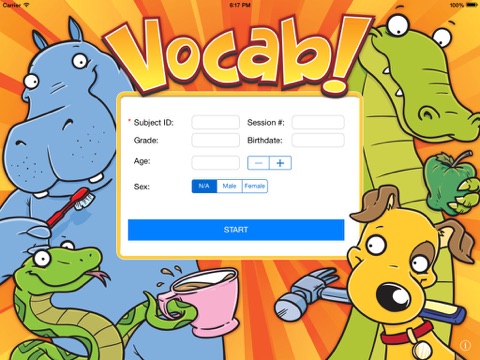
EYT Expressive Vocabulary-2 app for iPhone and iPad
Developer: University of Wollongong
First release : 05 Aug 2016
App size: 25.1 Mb
**EYT EXPRESSIVE VOCABULARY 2: now including verbs, as well as additional high difficulty items to increase the age and ability range assessed.**
Early Years Toolbox (EYT) Expressive Vocabulary 2 is an iPad-based assessment of childrens ability to identify and produce the target vocabulary words in response to depicted stimuli. It consists of 55 cartoon pictures of objects (e.g., flower) and actions (e.g., winking), for which children are asked to verbally name each item. Items are presented in developmental sequence, with a stop rule after a series of incorrect responses to prevent frustration associated with overly difficult items. This assessment takes an average of 5 minutes to complete.
Scores are presented on the final assessment screen. For more precise research applications, there are options to have the item by item data sent to a user-specified e-mail address or database. For more information, brief EYT training videos, and analysis resources, please visit http://www.eytoolbox.com.au
Languages embedded: English, Korean, Norwegian, Turkish and more in progress
About the Early Years Toolbox:
The Early Years Toolbox (EYT, for short) is comprised of brief, engaging game-like assessments of children’s self-regulation, executive functioning and vocabulary. These assessments are based on well-established and widely used measures, yet have been adapted and optimised on the basis of 20+ years of research experience working with young children.
NOTE FOR RESEARCHERS: If using this app for research and/or publication purposes, please cite the following as the original source article:
Howard, S. J., & Melhuish, E. (2017). An Early Years Toolbox (EYT) for assessing early executive function, language, self-regulation, and social development: Validity, reliability and preliminary norms. Journal of Psychoeducational Assessment, 35(3), 255-275.

